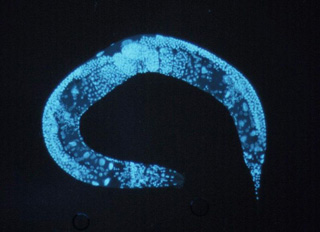
Caenorhabditis elegans, a species of nematode worm around 1 millimeter in length, is commonly used as a model organism to study diseases such as Alzheimer’s and Amyotrophic lateral sclerosis (ALS). (Image from NHGRI.)
Instructor(s)
Dr. Katie Harris
MIT Course Number
7.345
As Taught In
Spring 2013
Level
Undergraduate
Course Description
Course Features
Course Description
How do scientists discover the basic biology underlying human diseases? Simple organisms such as baker’s yeast, nematodes, fruit flies, zebrafish, mice and rats have allowed biologists to investigate disease at multiple levels, from molecules to behavior. In this course students will learn strategies of disease modeling by critically reading and discussing primary research articles. We will explore current models of neurodegenerative diseases such as Parkinson’s disease, childhood genetic diseases such as Fragile X syndrome, as well as models of deafness and wound healing. Our goal will be to understand the strategies biologists use to build appropriate models of human disease and to appreciate both the power and limitations of using simple organisms to analyze human disease.
This course is one of many Advanced Undergraduate Seminars offered by the Biology Department at MIT. These seminars are tailored for students with an interest in using primary research literature to discuss and learn about current biological research in a highly interactive setting. Many instructors of the Advanced Undergraduate Seminars are postdoctoral scientists with a strong interest in teaching.


